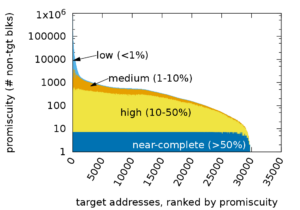We have released a new technical report “Do You See Me Now? Sparsity in Passive Observations of Address Liveness (extended)”, ISI-TR-2016-710, available at http://www.isi.edu/~johnh/PAPERS/Mirkovic16a.pdf

From the abstract:
Full allocation of IPv4 addresses has prompted interest in measuring address liveness, first with active probing, and recently with the addition of passive observation. While prior work has shown dramatic increases in coverage, this paper explores what factors affect contributions of passive observers to visibility. While all passive monitors are sparse, seeing only a part of the Internet, we seek to understand how different types of sparsity impact observation quality: the interests of external hosts and the hosts within the observed network, the temporal limitations on the observation duration, and coverage challenges to observe all traffic for a given target or a given vantage point. We study sparsity with inverted analysis, a new approach where we use passive monitors at four sites to infer what monitors would see at all sites exchanging traffic with those four. We show that visibility provided by monitors is heavy-tailed—interest sparsity means popular monitors see a great deal, while 99% see very little. We find that traffic is bipartite, with visibility much stronger between client-networks and server-networks than within each group. Finally, we find that popular monitors are robust to temporal and coverage sparsity, but they greatly reduce power of monitors that start with low visibility.
This technical report is joint work of Jelena Mirkovic, Genevieve Bartlett, John Heidemann, Hao Shi, and Xiyue Deng, all of USC/ISI.